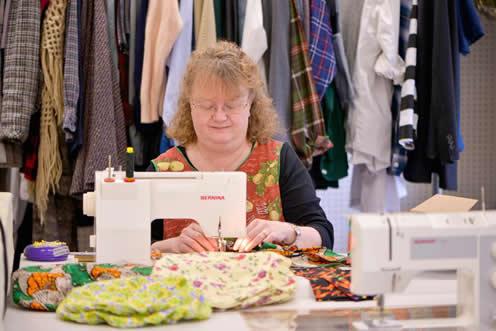
Stephen F. Austin State University Professor of Theatre Angela Bacarisse works on a homemade hat she is constructing for medical professionals who are combating COVID-19 during a medical supply shortage.
March 24, 2020 (Nacogdoches) – Standing outside a window of the School of Theatre costume shop at Stephen F. Austin State University, a Nacogdoches volunteer waited for a faculty member to hand her a package of elastic and cotton fabric. The items will be used to assemble surgical mask coverings to be used by local hospitals.
Inside the shop, located on the bottom floor of SFA’s Griffith Fine Arts Building, Angela Bacarisse, Stephen F. Austin State University theatre professor, and shop supervisor Barbara Blackwell were safely distanced from each other as they sewed more mask coverings, as well as hats.
Their work, along with the work of a small band of local seamstresses they have organized, is part of a grassroots effort in communities across the nation to help support local medical communities in combatting the spread of COVID-19.
“We saw on the internet that everybody is doing this,” Bacarisse said, adding that hospitals in various parts of the country have solicited assistance online and through social media to construct the masks using a Centers for Disease Control and Prevention-compliant pattern. “I wondered if there was really a need here, so I reached out to a representative from SFA’s Dewitt School of Nursing, who put me in contact with representatives from local hospitals, and they said ‘yes!’”
Kristine Sutton, chief nursing officer at Nacogdoches Memorial Health, said she was thrilled the costume shop and seamstresses are banding together to make a difference for health care workers on the front lines of a scary and unpredictable situation.
“The staff members are worried about protecting their patients and themselves to the highest degree possible, because they’re in such close proximity to patients and the virus is so contagious,” Sutton said. “We can’t take care of sick people if we’re not healthy. It’s really touching that these community members are using their own skills to be part of our team providing that front line of defense.”
Bacarisse and Blackwell have been joined by faculty and staff from other SFA departments, community members and some costume shop alumni to assemble the items. They are using fabric from home, as well as stockpiled fabric from the costume shop, along with fabric donations from the public. Hospital officials will pick up the finished items.
While a handmade mask does not offer the kind of protection that health care professionals really need, layering the handmade masks with reused surgical masks can provide another layer of protection. Using cotton fabric, the masks are assembled in such a way that N95 masks or respirators can slide inside. The do-it-yourself masks also can serve as a reminder to not touch the face.
“I’ll be honest, when I first heard about the idea of home-sewn masks, I was skeptical because the masks we typically use are medical grade and disposable for infection control reasons,” Sutton said. “But these masks are going to be a great second-line barrier for our staff. We’ll protect our medical grade masks behind the sewn masks, and at the end of the day, we can take them off and throw them in the wash. Our staff will be so relieved to know that they’re guaranteed a clean start at the beginning of their next shift.”
Bacarisse and Blackwell each said they have underlying health issues that put them at greater risk for contracting the virus, and they wanted to do their part to help during the public health crisis.
“We want to support the medical community in any way we can, and we have the skills to do this,” Bacarisse said.
Anyone interested in volunteering to help sew the masks and hats may contact Bacarisse at abacarisse@sfasu.edu.








